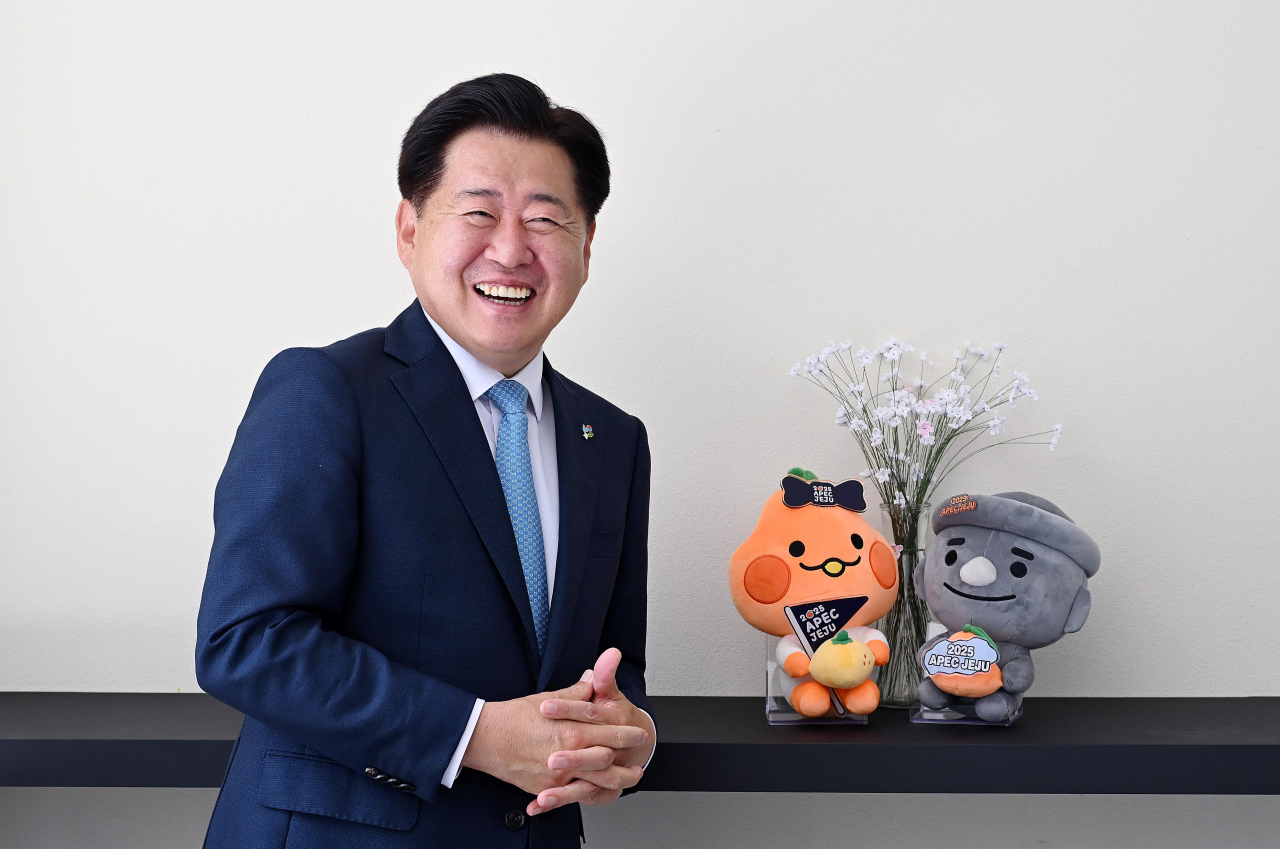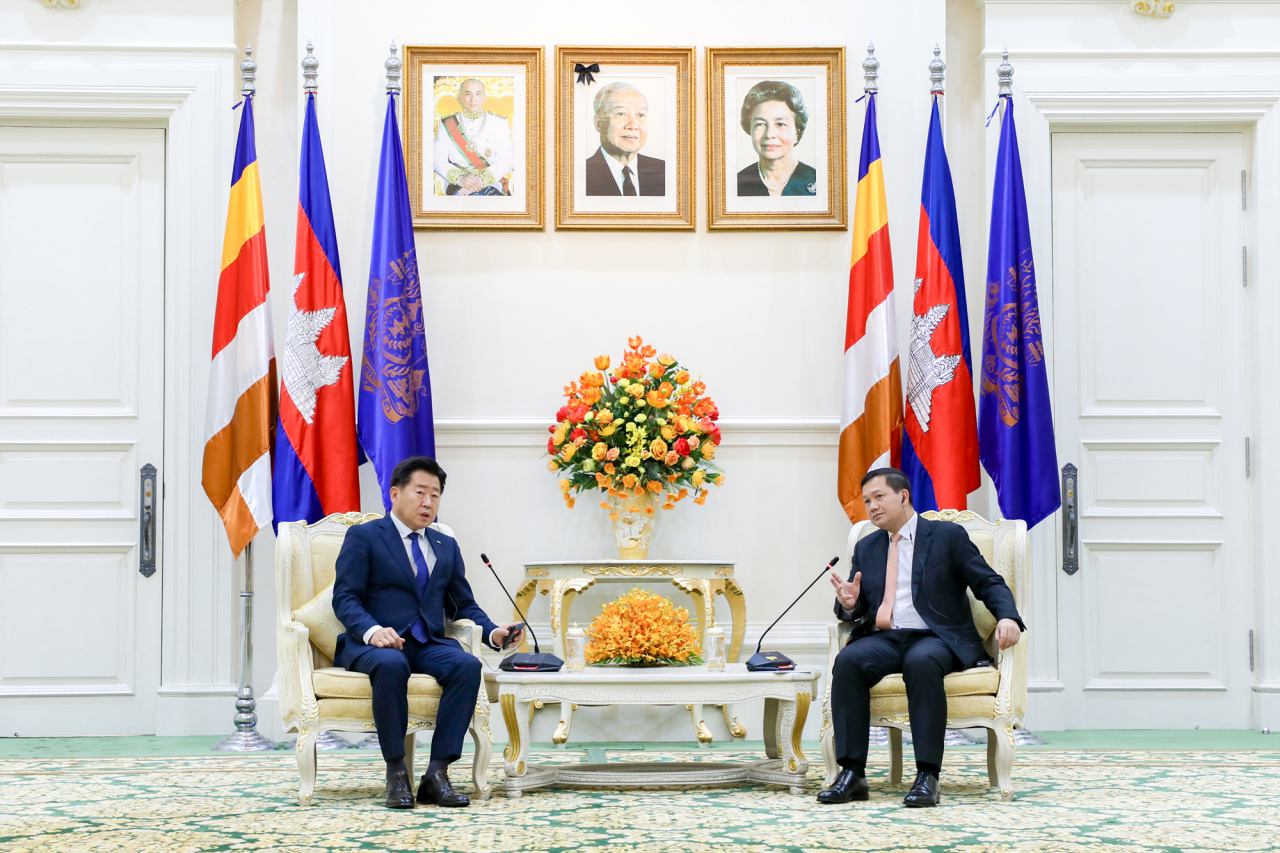[Herald Interview] Jeju governor eyes green hydrogen, space tech for island's future growth
Seasoned politician seeks to forge stronger ties with municipal governments around the world, host APEC Summit 2025
By Cho Chung-un, Jung Min-kyungPublished : June 13, 2024 - 15:24

South Korea’s southern island of Jeju is far more than just a scenic vacation destination. It is becoming a test bed for future industries including aerospace and hydrogen vehicles, according to its governor.
“You may not have known this, but Jeju is the closest South Korean territory to the equator,” said Oh Young-hoon, governor of Jeju Special Self-governing Province, told The Korea Herald in an interview in Seoul on Tuesday.
“This means that it is the perfect spot to launch satellites into space as they must orbit directly above the Earth’s equator,” he explained.
Its near-equator location, coupled with the island province’s new goal to grow as a hub for future industries, has already caught the attention of several private aerospace businesses here, stressed Oh.
Korean aerospace startup Contec, which is in the process of building Korea’s largest satellite ground station in western Jeju, plans to add seven more antennas by the end of this month, on top of the existing five. It is the only satellite ground station in Asia.
Hanwha Systems is also building a separate space center in the island’s southern city of Seogwipo, which is set to be completed by the end of 2025. The center will be a two-story building with a basement, spanning a total of 11,443 square meters. The defense electronics and ICT solutions provider under conglomerate Hanwha Group has invested 100 billion won ($72.6 million) in the project.
“More aerospace startups are clustering around the existing centers, which is a strong sign of development into a hub,” Oh pointed out.
Alongside aerospace technology, green hydrogen will be another pillar to support Jeju’s path toward becoming a test bed for future industries.
Last year, Jeju launched its green hydrogen production in the island's northeastern region to usher in a zero-carbon era. Korea’s first-ever green hydrogen-fueled buses now roam the island, powered by a 3.3-megawatt facility in eastern Jeju.
“All of the other facilities across Korea produce grey hydrogen, we have the only one that creates green hydrogen (which is better for the ecosystem and building a sustainable future). Which is why we plan to expand the green hydrogen-powered vehicles to street sweepers and trams.”
Jeju’s long-term goal is eventually to bring about transition of most the energy sources on the island to green hydrogen, which is produced by the electrolysis of water, using renewable electricity. Green hydrogen produces significantly lower emissions than grey hydrogen, which is derived from fossil fuels.
“Our goal is to build a 30-megawatt green hydrogen facility by 2030. Public housing complexes and industrial complexes across Jeju will be able to utilize clean energy through this," he said.
Another project that Jeju is currently focusing on is forging stronger cross-border relations with other municipal and provincial governments around the world.
Oh hopes Jeju will play a key part in Korea’s goal of strengthening relations with the Association of Southeast Asian Nations. It is why he has recently signed cross-border deals with the municipal government of Phnom Penh in Cambodia and the provincial government of Cebu in the Philippines, for employee exchange programs.
“The roles of municipal and provincial governments are expanding in diplomacy,” Oh said, demonstrating the efficiency of forging diplomatic ties on municipal levels rather than state levels.
“ASEAN nations are not only showcasing fast economic growth, but the youth population in the region accounts for most of the population, which is very important to us as well. ASEAN countries have the core fanbase for the Korean culture wave.”
Oh met with Cambodian Prime Minister Hun Manet on Wednesday afternoon (local time), to discuss the expansion of existing ties between Jeju and Cambodia. The Jeju government said that both sides pledged to diversify exchange through several tourism and culture projects, and seek ways to forge cross-border economic cooperation as well.
Jeju is currently competing with two other cities here – Incheon and Gyeongju – to become the host city for the 2025 Asia-Pacific Economic Cooperation Summit.
According to Oh, Jeju’s scenic nature is not the only reason why Korea’s southern resort island is ready to host the next APEC summit. Its infrastructure, including its 62,125-square-meter International Convention Center Jeju, located near a cluster of high-end hotels, adds to the island’s abundant charm.
“The three key requirements that an APEC host city candidate must have are: a sufficient venue to cater to a global summit, stellar accommodations and strong security. Of course, other fellow host city candidates such as Incheon and Gyeongju have their own charms and assets, but I feel like Jeju has the traits that could really capture the hearts of leaders across Asia and the Pacific.”
Oh highlighted that Jeju’s current transition into a green hydrogen society aligns with the values and goals of APEC, including sustainability and inclusiveness.

“The values of peace, prosperity and co-existence that Jeju wants to align with are the values of APEC. We are currently leading sustainable growth and innovation within Korea and outside Korea through our cooperation with ASEAN nations and actively fostering future industries such as green hydrogen and private aerospace companies.”
On whether Jeju has plans to establish its own refugee admission program, Oh said a related blueprint in line with the Ministry of Justice’s plan to bolster the nation’s immigration policies is set to be completed by the end of July.
Some 500 refugees, mostly Yemeni men, are currently residing on the island, after seeking asylum from 2016 to 2018. They first entered through its visa-waiver program, were granted humanitarian stay permits and are staying until a decision is made on their status.
“We are trying to approach the subject with an open mind and utilize existing visas to cater to both refugees and immigration,” Oh explained.
Oh Young-hoon, 55, is a two-term liberal lawmaker who took office as governor of Jeju Special Self-Governing Province in July 2022. He is the first lawmaker from the Democratic Party of Korea and its liberal predecessors to become the governor of the island province since 2002.
Oh entered politics in 2002 and has taken on several roles within the Democratic Party since he was first elected as a lawmaker in 2016. He has occupied key positions within the party including vice floor leader and spokesperson.
He earned both his bachelor's degree and a master's degree in business at Jeju National University.


















![[Weekender] Meet my green friends: Home gardening for healing, companionship](http://res.heraldm.com/phpwas/restmb_idxmake.php?idx=652&simg=/content/image/2024/06/20/20240620050860_0.jpg&u=)

![[Drama Tour] Relaxing weekend trip to Yangju](http://res.heraldm.com/phpwas/restmb_idxmake.php?idx=652&simg=/content/image/2024/06/20/20240620050850_0.jpg&u=)
